Jan 19, 2025
Introduction of Chapter # 8 (Al Anfal)
بِسْمِ ٱللَّٰهِ ٱلرَّحْمَٰنِ ٱلرَّحِيمِ,
(bi-smi llāhi r-raḥmāni r-raḥīm)
"In the name of Allah, the Most Gracious, the Most Merciful"
"Assalamualaikum/Hello and welcome! It's a pleasure to have you join us on this platform. Feel free to explore and engage with our community."
Feel free to join the cafe and our Instagram page for notifications and updates;
Hilokal;
https://hilokal.page.link/eUxfM
Instagram;
https://instagram.com/ideologyovlife?igshid=NjIwNzIyMDk2Mg==
Chapter 8, Introduction
Surah Al Anfal Shan e Nuzool
Recitation.
Translation.
Tafseer.
Difficult Vocabularies from INTRODUCTION (Chapter # 8 Al A'nfal)
1- Gloating. (Adjective)
(Feeling or showing great pleasure or satisfaction, often because of someone else's failure or misfortune.)
2- Valor. (Noun)
(Bravery or courage, often demonstrated in battle or other challenging situations.)
3- Accede. (Verb)
(To agree or consent to something, often formally.)
4- Refrain. (Verb)
(To stop oneself from doing something, especially when it is difficult.)
5- Abode. (Noun)
(A place where someone lives or stays.)
6- Enacte. (Verb)
(Made into a law or formally approved.)
7- Cowed. (Adjective)
(Feeling frightened or intimidated, often to the point of being unable to act.)
8- Foresight. (Noun)
(The ability to predict or plan for the future.)
9- Magnanimity. (Noun)
(The quality of being generous and forgiving, especially towards someone who has wronged you.)
10- Obstacle. (Noun)
(Things that block or hinder progress.)
11- Superstition. (Noun)
(A belief or practice that is not based on reason or science.)
12- Petty. (Adjective)
(Small or unimportant.)
13- Prejudices. (Noun)
(Preconceived opinions or judgments, often based on incomplete information.)
14- Reckon. (Verb)
(To think or believe something.)
15- Menace. (Noun)
(A threat or danger.)
16- Endure. (Verb)
(Suffered patiently or tolerated something difficult.)
17- Persecution. (Noun)
(Treating someone cruelly or unfairly because of their beliefs, race, or other characteristics.)
18- Scatterred. (Adjective)
(Spread out or dispersed over a wide area.)
19- Decisive. (Adjective)
(Having or showing the ability to make decisions quickly and confidently.)
20- Consolidate. (Verb)
(To combine or unite things, making them stronger or more effective.)
21- Renegade. (Noun)
(A person who rejects or deserts a cause, organization, religion or country.)
22- Antagonistic. (Adjective)
(Actively opposing or showing unfriendliness towards something or someone.)
23- Preliminary. (Adjective)
(Coming before a more important action or event, especially introducing or preparing for it.)
24- Persuade. (Verb)
(To make someone do or believe something by giving them a good reason to do it or by talking to that person and making them believe it.)
25- Expedition. (Noun)
(An organized journey for a particular purpose.)
26- Incursions. (Noun)
(A sudden attack on or act of going into a place, especially across a border.)
27- Plunder. (Verb)
(To steal goods violently from a place, especially during a war.)
28- Scantily. (Adverb)
(Wearing very little clothing.)
29- Frantic. (Adjective)
(Almost out of control because of extreme emotion, such as worry.)
30- Rending. (Present Participle)
(Tear (something) into pieces..)
31- Cavalry. (Noun)
(The group of soldiers in an army who fight in tanks, or (especially in the past) on horses.)
32- Overawe. (Verb)
(To cause someone to feel a mixture of respect and fear.)
33- Invasion. (Noun)
(An occasion when an army or country uses force to enter and take control of another country.)
34- Invade. (Verb)
(To enter a country by force with large numbers of soldiers in order to take possession of it.)
35- Embolden. (Verb)
(To make someone brave.)
36- Solemn. (Adjective)
(Serious and without any humour.)
37- Plunge. (Verb)
(To (cause someone or something to) move or fall suddenly and often a long way forward, down, or into something.)
38- Succor. (Noun, Verb)
(Helping and co-operating.)
39- Beguiled. (Past Participle)
(Charm or enchant (someone), often in a deceptive way.)
40- Sanctity. (Noun)
(The quality of being very important and deserving respect.)
41- Perseverance. (Noun)
(Continued effort to do or achieve something, even when this is difficult or takes a long time.)
42- Insurmountable. (Adjective)
((Especially of a problem or a difficulty) so great that it cannot be dealt with successfully.)
Occasion of Revelation / Historical Background
The second possibility was that they would not invade Al-Madinah but try only to escort their caravan safely and securely by a mere show of force. In that case, too, if the Muslim remained inactive, it would affect their reputation adversely. Obviously, this weak stand in the conflict would embolden the other Arabs also and make the position of the Muslims very insecure in the country and the surrounding clans would, at the instance of the Quraish, start hostilities against them, and the Jews, the hypocrites and the mushriks of Al- Madinah would openly rise against them and not only endanger their security of life, property and honor but make it difficult for them even to live there.
The Muslims would not be able to inspire the enemy with awe so as to keep safe from them their life, property and honor. A careful study of the situation led the Holy Prophet to make up his mind to take a decisive step and go into the battle with whatever little strength he could muster, for thus and thus only could he show whether the Muslim Community had the right to survive or was doomed to perish.
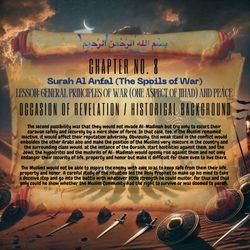
Occasion of Revelation / Historical Background
When he arrived at this momentous decision, he called the Muhajirin and the Ansar together and placed the whole position before them, without any reservation. He said, "Allah has promised that you will confront one of the two, the trade caravan coming from the north or the army of the Quraish marching from the south. Now tell me which of the two you want to attack!" A large majority of the people replied that they wanted to attack the caravan. But the Holy Prophet who had something else before him, repeated the same question. At this Miqdad bin 'Amr, a Muhajir, stood up and said, "0 Messenger of Allah! Please march to the side to which your Lord commands you; we will accompany you wherever you go. We will not say like the Israelites, 'Go and let you and your Lord fight we will wait'. In contrast to them we say, 'Let you and your Lord fight; we will fight by your side to our last breath'." Even then he did not announce any decision but waited for a reply from the Ansar who had not yet taken any part in any battle of Islam. As this was the first opportunity for them to prove that they were ready to fulfill their promise of fighting for the cause of Islam, he repeated the question without directly addressing them. At this, Sa'ad bin Mu'az, an Ansar, stood up and said, "Sir, it appears that you are putting the question to us." When the Holy Prophet said, "Yes", the Ansar replied, "We have believed in you and confirmed that what you have brought is the Truth, and have made a solemn pledge with you that we will listen to you and obey you. Therefore, 0 Messenger of Allah, do whatever you intend to do. We swear by Allah Who has sent you with the Truth that we are ready to accompany you to the sea shore and if you enter it, we will plunge into it. We assure you that not a single one of us will remain behind or forsake you, for we will not hesitate at all to go to fight, even if you should lead us to the battlefield tomorrow. We will remain steadfast in the battle and sacrifice our lives in the fight. We do hope that by the grace of Allah our behavior will gladden your heart. So, trusting in Allah's blessing, take us to the battlefield."
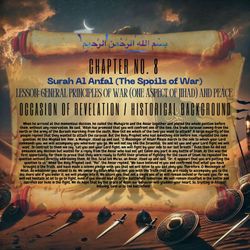
Occasion of Revelation / Historical Background
After these speeches it was decided that they should march towards the army of the Quraish and not towards the trade caravan. But it should be noted that the decision was of an ordinary nature. For the number of people, who came forward to go to the battlefield, was only a little more than three hundred (86 Muhajirs, 62 from Aus and 170 from Khazraj). Then the little army was ill-armed and hardly equipped for battle. Only a couple of them had horses to ride and the others had to take their turn in threes and fours on the back of a camel, out of the 70 they had in all. Above all, they had not got enough weapons for the battle; only 60 of them had armors. It is, therefore, no wonder that with the exception of those who were prepared to sacrifice their lives for the cause of Islam, the majority of those who had joined the expedition, were so filled with fear that they felt as if they were knowingly going into the jaws of death. Then there were people who always looked at things from a selfish point of view. Though they had embraced Islam, they did not realize that their faith would demand the sacrifice of their lives and properties from them; they were of the opinion that it was a mad expedition prompted by irrational enthusiasm for religion. But the Holy Prophet and the true Believers had realized the urgency of that critical hour which required the risk of life: therefore they marched straight to the south-west, wherefrom the army of the Quraish was coming. This is a clear proof of the fact that from the very beginning they had gone out to fight with the army and not to plunder the caravan. For if they had aimed at plundering the caravan they would have taken the north- westerly direction and not the south- westerly one.
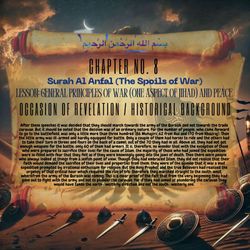
Occasion of Revelation / Historical Background
The two parties met in combat at Badr on the seventeenth of Ramadan. When the two armies confronted each other and the Holy Prophet noticed that the Quraish army outnumbered the Muslims by three to one and was much better equipped, he raised his hands up in supplication and made this earnest prayer with great humility: "O Allah! Here are the Quraish proud of their war material: they have come to prove that Thy Messenger is false. O Allah! now send that success that Thou hast promised to give me. O Allah! If this little army of Thy servants is destroyed, then there will be left none in the land to worship Thee."
In this combat the emigrants from Makkah were put to the hardest test for they had to fight against their own near and dear relatives and put to the sword their fathers, their sons, their paternal and maternal uncles and their brothers. It is obvious that only such people could have come out successful in this hardest of tests as had accepted the Truth sincerely and cut off all relations with falsehood. And in another way the test to which the Ansar were put was not less hard. So far they had only alienated the powerful Quraish and their allies by giving shelter to the Muslims against their wishes but now, for the first time, they were going to give fight to them and to sow the seeds of a long and bitter war with them. This was indeed a very hard test for it meant that a small town with a population of a few thousand inhabitants was going to wage a war with the whole of Arabia. It is obvious that only such people could take this bold step who believed in the Truth of Islam so firmly that they were ready to sacrifice every personal interest for its sake.
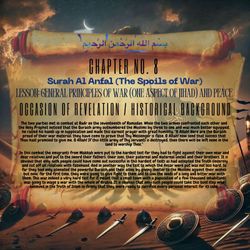
Occasion of Revelation / Historical Background
So Allah accepted the self-sacrifices of the Muhajirin and the Ansar because of their true faith, and rewarded them with His success. The proud, well- armed Quraish were routed by these ill-equipped devotees of Islam. Seventy men of their army were killed and seventy captured as prisoners and their arms and equipment came into the hands of the Muslims as spoils of war. All their big chiefs, who were their best soldiers and who had led the opposition to Islam, were killed in this Battle. No wonder that this decisive victory made Islam a power to be reckoned with. A Western research scholar says that before the Battle of Badr, Islam was merely a religion and a state but after the Battle it became the state religion, nay, the state itself.
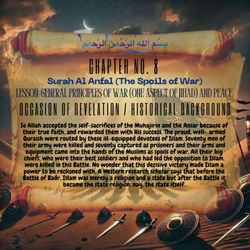
Topics & Discussion
It is this great Battle that has been reviewed in this Surah. But let it be noted that in some respects this review is quite different from the reviews that are usually made by the worldly commanders after a great victory.
1. Instead of gloating over the victory, the moral weaknesses that had come to the surface in that expedition have been pointed out so that the Muslims should try their best to reform themselves.
2. It has been impressed upon them that the victory was due to the success of Allah rather -than to their own valor and bravery so that the Muslims should learn to rely on Him and obey Allah and His Messenger alone.
3. The moral lesson of the conflict between the Truth and falsehood has been enunciated and the qualities which lead to success in a conflict have been explained.
4. Then the Surah addresses the mushriks, the hypocrites, the Jews and the prisoners of this war in a very impressive manner that should teach them a good lesson.
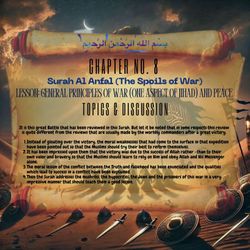
Topics & Discussion
5. It also gives instructions in regard to the spoils of war. The Muslims have bean told not to regard these as their right but as a bounty from Allah. Therefore they should accept with gratitude the share that is granted to them out of it and willingly accede to the share which Allah sets apart for His cause and for the help of the needy.
6. Then it also gives normal instructions concerning the laws of peace and war for these were urgently needed to be explained at the stage which the Islamic Movement had entered. It enjoined that the Muslims should refrain from ways of "ignorance" in peace and war and thus should establish their moral superiority in the world. It also meant, to demonstrate to the world in actual practical life the morality which it had been preaching to the world from the very beginning of Islam and had been enjoining that practical life should be based on the same.
7. It also states some articles of the Islamic Constitution which help differentiate the status of the Muslims living within the limits of Dar-ul-Islam (the Abode of Islam) from that of the Muslims living beyond its limits.
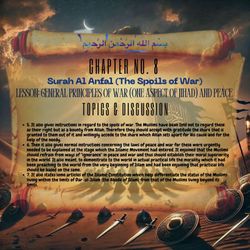
Subject : Problems of Jihad.
This surah enunciates general principles of war (one aspect of Jihad) and peace while reviewing the Battle of Badr and uses them for the moral training of the Muslims.
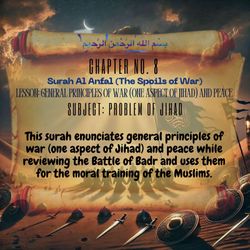
Topics and their Interconnection
From Verses 1 - 41
This portion deals with the problems of the "Spoils of War". The Quran says that these are not the spoils of war but the "Bounties of Allah" and proves this by showing that the victory at Badr (and in all other battles, too,) was won by His succor and not by the efforts of the Muslims. It also declares (in v. 40) that the war aim of the Muslims should be to eliminate all unfavorable conditions for the establishment of Islam and not to gain spoils. Moreover, the spoils, being the bounties of God, belong to Allah and His Messenger and they alone are entitled to allocate them. Then after conditioning the Muslims to accept these things, the different shares have been allocated in v. 41.
From Verses 42 - 54
The Battle of Badr was ordained by Allah so that Islam should triumph over "ignorance". The lesson from this is that the Muslims should trust in God and prepare themselves for war and should not be beguiled by Satan as the disbelievers were.
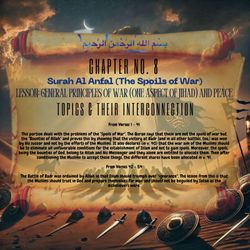
Topics and their Interconnection
From Verses 55 - 59
Sanctity of treaties has been enjoined and the Muslims commanded to observe them as long as the other party does not break them.
From Verses 60 - 66
The Muslims should always be prepared for war on every front, but should be ready to make peace if the other party is inclined towards it.
From Verses 67 - 71
In these verses, instructions about prisoners of war have been given.
From Verses 72 - 75
In order to keep the Muslims joined together against their enemies, they have been taught to have cordial relations with one another.
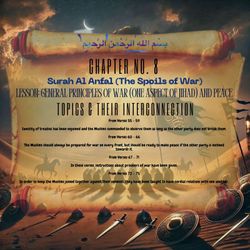
Conclusion
Surah Al-Anfal is a chapter of the Quran that provides valuable guidance for believers, emphasizing the importance of faith, unity, trust in Allah, and perseverance during challenging times. The historical context of the Battle of Badr adds depth to its lessons, reminding us of the power of faith, prayer, and unity in overcoming seemingly insurmountable obstacles. It continues to serve as a source of inspiration and guidance for Muslims, offering a blueprint for dealing with trials and tribulations in life while remaining steadfast in one’s faith.
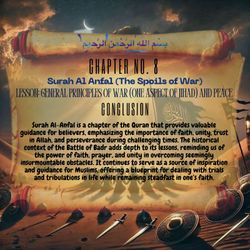
Thankyou everyone for joining.
May Allah rewards all of you for your precious time spent here & may Allah keeps pouring his blessings upon you and your loved ones.
Stay safe & and blessed.
Aslamualaikum to all of you.
By undefined
25 notes ・ 3 views
English
Proficient